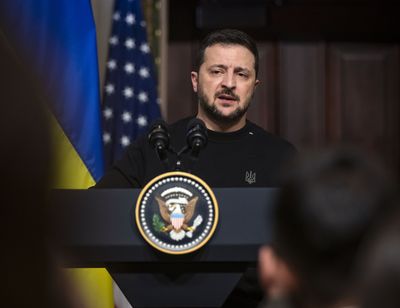Trump, Zelenskyy speak as election hangs over U.S. aid to Ukraine

Former president Donald Trump and Ukrainian President Volodymyr Zelenskyy said they spoke on Friday as the U.S. presidential race hangs over the future of the war in Ukraine.
Zelenskyy said in a statement that he emphasized the importance of U.S. support for Ukraine amid Russia’s invasion, now in its third year, and added that he and Trump agreed “to discuss at a personal meeting what steps can make peace fair and truly lasting.” Trump, in a social media post about their phone call, said he will “end the war” and that “Both sides will be able to come together and negotiate a deal that ends the violence” – but did not elaborate on the terms he would accept.
Trump has spoken with many foreign leaders as he seeks the presidency, but his call with Zelenskyy is especially significant because of the election’s implications for U.S. policy toward Ukraine and Russia. A Trump victory could herald an abrupt change to the transatlantic support for Kyiv that President Biden has established.
With less than four months left until the election, Trump and Biden have taken sharply contrasting positions on the war in Ukraine. Biden has been a staunch defender of Ukraine and a vocal critic of Russia’s invasion. Trump, who for years has often praised Russian President Vladimir Putin and touted an “America First” policy anchored in skepticism about intervention abroad, has privately said he could end the war by pressuring Ukraine to give up some territory, people familiar with the matter previously told the Washington Post. He has also suggested he would scale back vital U.S. military aid.
At the Republican National Convention in Milwaukee this week, Trump formally accepted the nomination and named a running mate, Sen. J.D. Vance (R-Ohio), who has strongly criticized U.S. assistance to Ukraine and voted against a major aid package this spring. Vance’s selection deepened fears among proponents of U.S. engagement abroad that a second Trump term would dramatically shift the United States’ posture. Zelenskyy has pushed for continued support from allies around the globe, urging them not to let up in helping his country’s cause.
When Trump was president, he had a private chat with Zelenskyy that culminated in a rare kind of presidential rebuke on Capitol Hill. Five years ago, a July conversation with Zelenskyy led to Trump’s first impeachment in 2019. Trump had urged Zelenskyy to investigate Biden, a political rival, while raising the possibility of a White House meeting Zelenskyy wanted – prompting a whistleblower complaint and an effort to remove Trump from office that failed in the Republican-controlled Senate.
Both leaders said in their readouts of Friday’s conversation that Zelenskyy congratulated Trump on securing the Republican nomination for president and condemned a gunman’s attempt to assassinate Trump at a campaign rally last weekend in Pennsylvania.
In his statement on the call, Zelenskyy wrote that he “noted the vital bipartisan and bicameral American support for protecting our nation’s freedom and independence” and said, “Ukraine will always be grateful to the United States for its help in strengthening our ability to resist Russian terror. Russian attacks on our cities and villages continue every day.”
Putin has said he will end the war only if Kyiv drops its efforts to join NATO and surrenders territory claimed by Russia – demands that Ukraine flatly rejects. Trump said at a debate with Biden in June that Putin’s terms are “not acceptable,” but also emphasized the amount of U.S. money going to Ukraine and said he would push to end the war swiftly.
“I will have that war settled between Putin and Zelenskyy as president-elect, before I take office,” Trump said, lamenting “people being killed so needlessly, so stupidly.” He did not explain how he would broker such a peace and suggested Putin respects him more than Biden.
Biden has repeatedly pushed for continued assistance to Ukraine, and in April signed the aid package with bipartisan support, despite fierce resistance from some “America First” Republicans who argued such spending is not in the United States’ interest.
Some of the billions in funds were given via a loan that the U.S. president could forgive. Trump had advocated for a loan rather than a gift.
Vance, Trump’s vice-presidential pick, has emerged as a leader of the GOP’s isolationist wing, concerning some hawkish Republicans who believe it’s important for the United States to aid allies abroad. Vance wrote an op-ed this spring arguing that the support the Biden administration urged would not defeat Russia.
Zelenskyy advocated forcefully for aid at this month’s NATO summit in Washington and noted the foreign policy stakes of the presidential election. “The whole world is looking to November,” he said.
Like Biden, Zelenskyy argued that Putin would not stop in Ukraine if unchecked and would go on to threaten NATO countries, forcing further U.S. involvement. The Ukrainian president acknowledged Trump’s and Biden’s differences but said he believes Putin “will hate both of them.”
- – -
Michael Birnbaum contributed to this report.